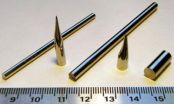(Press-News.org) EUGENE, Ore. -- (Jan. 12, 2011) -- As adolescents move from elementary school into their middle or junior-high years, changes in friendships may signal potential academic success or troubles down the road, say University of Oregon researchers.
A new study, appearing in the February issue of the Journal of Early Adolescence, found that boys and girls whose friends are socially active in ways where rules are respected do better in their classroom work. Having friends who engage in problem behavior, in contrast, is related to a decrease in their grades. Having pro-social friends and staying away from deviant peers proved more effective for academic payoffs than simply being friends with high-achieving peers.
The middle school/junior high years are a major transition for children, as students move away from grade-school classrooms led by one teacher every day into an environment of multiple classes with different teachers and opportunities to make new friends. This new study -- conducted by Marie-Helene Veronneau and Thomas J. Dishion of the UO Child and Family Center -- focused solely on the role played by friendship on academic achievement.
Their findings emerged from data collected in a longitudinal study of 1,278 students -- 55 percent of them girls -- done previously by center researchers. In that study, students named their three best friends. Instead of relying on student reports of their peers' behaviors and grades, researchers in the new study looked specifically at behavioral and academic records of the friends.
A surprise discovery was that girls who already were struggling academically in sixth grade actually suffered later when their chosen friends were already those making the highest grades, Veronneau said. "We don't know the mechanisms on why it is this way for girls, but we can speculate that girls compare themselves to their friends and then decide they are not doing very well. Perhaps this affects their self-efficacy and belief in their own abilities."
For girls already doing well in sixth grade, however, there was an opposite influence. "It could be for these girls, having friends who also are getting good grades, school is challenging and stimulating, and they end up doing better than expected," she said.
The study's findings clearly show that in the middle school years "a great deal of learning is taking place that is not being attended to," said Dishion, director of the Child and Family Center and professor of school psychology. "Puberty is taking place. The brain is changing rapidly. Kids' brains are almost wired to be reading the social world to see how they fit in, and the school is the arena for it."
These transitional years may be pivotal, Dishion said. In a previous longitudinal study, he said, he and colleagues looked at the impacts of peer relationships of young people at ages 13, 15 and 17 to look for predictive indicators of life adjustments at age 24. Those influences at age 13 -- going back to middle school -- were the most influential, he noted. While instruction is school is vitally important, he said, it may be that more eyes should be looking at shifting peer relationships.
In their conclusions, Dishion and Veronneau suggested that responsible adults -- at school and at home -- "should pay special attention" to changes in friendships and encourage students to pursue and participate in adult-supervised activities to promote pro-social relationships.
"Parents should pay attention to what their kids are doing and with whom they hang out," Veronneau said. "If parents notice that there is a shift in a child's friendship network, they should try to get to know those kids, talk with teachers and communicate naturally with their own child about where they are going and when they will be coming home."
INFORMATION:
The research was supported through grants from the Social Sciences and Humanities Research Council of Canada to Veronneau and from the National Institute on Drug Abuse at the National Institutes of Health to Dishion.
About the Child and Family Center
The University of Oregon Child and Family Center staff is dedicated to understanding and promoting mental health and resilience within families in all cultural communities. The institute conducts research on social-emotional development from infancy through adolescence and provides innovative assessment, prevention, and intervention services for children and families.
Media Note: Five audio segments containing comments from the researchers may be obtained by sending an email request to jebarlow@uoregon.edu, stating your preferred format. They may be heard at: http://bit.ly/eI7u8u
Sources: Marie-Helene Veronneau, courtesy research associate, UO Child and Family Center, 541-346-4708, mariev@uoregon.edu; Thomas J. Dishion, professor of school psychology and director of the Child and Family Center, 346-3620 or 541-346-4805, dishion@uoregon.edu
Links:
Child and Family Center: http://cfc.uoregon.edu/index.htm
Dishion faculty page: http://education.uoregon.edu/faculty.htm?id=255
Veronneau page: http://cfc.uoregon.edu/postdocs.htm
UO School Psychology Program: http://education.uoregon.edu/field.htm?id=34
UO Research on Facebook: http://www.facebook.com/UniversityofOregonScience
Middle school is when the right friends may matter most
Academic success is boosted by way of pro-social friends and avoiding deviant peer, researchers say
2011-01-13
ELSE PRESS RELEASES FROM THIS DATE:
Attention ladies and gentlemen: Courtship affects gene expression
2011-01-13
Scientists from Texas have made an important step toward understanding human mating behavior by showing that certain genes become activated in fruit flies when they interact with the opposite sex. This research, published in the January 2011 issue of the journal GENETICS (http://www.genetics.org), shows that courtship behaviors may be far more influenced by genetics than previously thought. In addition, understanding why and how these genes become activated within social contexts may also lead to insight into disorders such as autism.
"Be careful who you interact with," ...
Caltech-led team creates damage-tolerant metallic glass
2011-01-13
PASADENA, Calif.—Glass is inherently strong, but when it cracks or otherwise fails, it proves brittle, shattering almost immediately. Steel and other metal alloys tend to be tough—they resist shattering—but are also relatively weak; they permanently deform and fail easily.
The ideal material, says Marios Demetriou, a senior research fellow at the California Institute of Technology (Caltech), has the advantage of being both strong and tough—a combination called damage tolerance, which is more difficult to come by than the layperson might think. "Strength and toughness ...
23andMe presents top 10 most interesting genetic findings of 2010
2011-01-13
MOUNTAIN VIEW, CA – January 11, 2011 – 23andMe has released its first annual list of what it felt to be the 10 most interesting and significant genetic findings in 2010, as part of an ongoing journey to understand the role of genetics in personal health and human development.
"Our understanding of the human genome is accelerating at a phenomenal rate," stated Anne Wojcicki, co-founder and CEO of 23andMe. "Below we have compiled a list of our top ten favorite genetic discoveries from 2010. We look forward to exploring more discoveries in 2011."
Customers of 23andMe ...
New method will triple amount of genetic information from newborn blood spot screenings
2011-01-13
Grand Rapids, Mich. (January 12, 2011) – Van Andel Research Institute (VARI) researchers have developed a method that can yield more information from archived newborn blood that has implications for a vast array of research, including population health studies and answering questions about diseases in infants and children.
In a recent study published in Pathology International, VARI researchers detected approximately 9,000 activated genes in samples from adult blood spots on Guthrie cards that had been archived anywhere from six months to three years. Researchers say ...
Natural dissolved organic matter plays dual role in cycling of mercury
2011-01-13
Nature has a bit of a Jekyll and Hyde relationship with mercury, but researchers at the Department of Energy's Oak Ridge National Laboratory have made a discovery that ultimately could help explain the split personality.
While scientists have known that microbes in aquatic environments make methylmercury, a more toxic form of mercury that accumulates in fish, they also know that nature and other types of bacteria can transform methylmercury to less toxic forms. What they haven't completely understood are the mechanisms that cause these transformations in anoxic environments ...
Robotic surgery of 'tremendous benefit' to patients, say JGH researchers
2011-01-13
This press release is available in French.
Robot-assisted surgery dramatically improves outcomes in patients with uterine, endometrial, and cervical cancer, said researchers at the Jewish General Hospital's Lady Davis Institute for Medical Research in Montreal. Moreover, because of fewer post-operative complications and shorter hospital stays, robotic procedures also cost less.
These results were published in late 2010 in a series of studies in The Journal of Robotic Surgery and The International Journal of Gynecological Cancer.
To date, adoption of robotic surgery ...
Astronomers identify most distant galaxy cluster
2011-01-13
RIVERSIDE, Calif. — Bahram Mobasher, a professor of physics and astronomy at the University of California, Riverside, is a member of an international team of astronomers that has uncovered a burgeoning galactic metropolis, the most distant known in the early universe. This ancient collection of galaxies presumably grew into a modern galaxy cluster similar to the massive ones seen today.
The developing cluster, named COSMOS-AzTEC3, was discovered and characterized by multi-wavelength telescopes, including NASA's Spitzer, Chandra and Hubble space telescopes, and the ground-based ...
Taking the pulse of a black hole system
2011-01-13
Using two NASA X-ray satellites, astronomers have discovered what drives the "heartbeats" seen in the light from an unusual black hole system. These results give new insight into the ways that black holes can regulate their intake and severely curtail their growth.
This study examined GRS 1915+105 (GRS 1915 for short), a binary system in the Milky Way galaxy containing a black hole about 14 times more massive than the Sun that is feeding off material from a companion star. As this material falls towards the black hole, it forms a swirling disk that emits X-rays. The black ...
New guidelines for preventing falls in the elderly include: start tai chi, cut-back on meds
2011-01-13
In the first update of the American Geriatrics Society and the British Geriatric Society's guidelines on preventing falls in older persons since 2001, they now recommend that all interventions for preventing falls should include an exercise component and that a number of new assessments should be used, including; feet and footwear, fear of falling, and ability to carry out daily living activities. The guidelines, a summary of which are published today in the Journal of the American Geriatrics Society, also state that fall screening and prevention should be a part of all ...
TGen and Genomic Health Inc. discover genes affecting cancer drug
2011-01-13
PHOENIX, Ariz. — Jan. 13, 2011 — Genomic research could help doctors better target a drug widely used to treat colorectal cancer patients, according to a study by Genomic Health Inc. (Nasdaq: GHDX) and the Translational Genomics Research Institute (TGen).
The drug, oxaliplatin, is widely used in colon cancer. It is used in early disease, following surgery in those cancers that are likely to recur. It is also used in advanced disease to slow progression of the cancer where it has spread to other parts of the body.
However, a significant number of patients experience ...
LAST 30 PRESS RELEASES:
SfN announces Early Career Policy Ambassadors Class of 2026
Spiritual practices strongly associated with reduced risk for hazardous alcohol and drug use
Novel vaccine protects against C. diff disease and recurrence
An “electrical” circadian clock balances growth between shoots and roots
Largest study of rare skin cancer in Mexican patients shows its more complex than previously thought
Colonists dredged away Sydney’s natural oyster reefs. Now science knows how best to restore them.
Joint and independent associations of gestational diabetes and depression with childhood obesity
Spirituality and harmful or hazardous alcohol and other drug use
New plastic material could solve energy storage challenge, researchers report
Mapping protein production in brain cells yields new insights for brain disease
Exposing a hidden anchor for HIV replication
Can Europe be climate-neutral by 2050? New monitor tracks the pace of the energy transition
Major heart attack study reveals ‘survival paradox’: Frail men at higher risk of death than women despite better treatment
Medicare patients get different stroke care depending on plan, analysis reveals
Polyploidy-induced senescence may drive aging, tissue repair, and cancer risk
Study shows that treating patients with lifestyle medicine may help reduce clinician burnout
Experimental and numerical framework for acoustic streaming prediction in mid-air phased arrays
Ancestral motif enables broad DNA binding by NIN, a master regulator of rhizobial symbiosis
Macrophage immune cells need constant reminders to retain memories of prior infections
Ultra-endurance running may accelerate aging and breakdown of red blood cells
Ancient mind-body practice proven to lower blood pressure in clinical trial
SwRI to create advanced Product Lifecycle Management system for the Air Force
Natural selection operates on multiple levels, comprehensive review of scientific studies shows
Developing a national research program on liquid metals for fusion
AI-powered ECG could help guide lifelong heart monitoring for patients with repaired tetralogy of fallot
Global shark bites return to average in 2025, with a smaller proportion in the United States
Millions are unaware of heart risks that don’t start in the heart
What freezing plants in blocks of ice can tell us about the future of Svalbard’s plant communities
A new vascularized tissueoid-on-a-chip model for liver regeneration and transplant rejection
Augmented reality menus may help restaurants attract more customers, improve brand perceptions
[Press-News.org] Middle school is when the right friends may matter mostAcademic success is boosted by way of pro-social friends and avoiding deviant peer, researchers say




